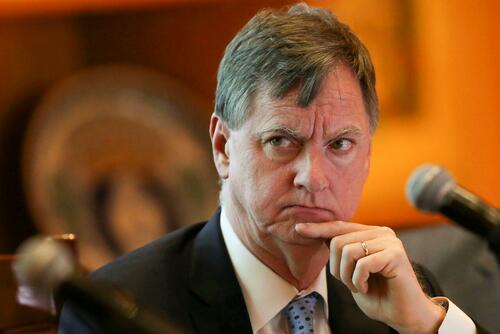Chicago Fed President Says Rate Hikes Will Continue Even If It Leads To Job Losses
Reiterating a message sent by numerous central bankers in the past couple of weeks, Chicago Fed President Charles Evans took a hawkish tone during an interview with CNBC and argued in favor of aggressive rate hikes by the central bank.
Only three weeks before the Fed’s next meeting where they are expected to raise interest rates again by 0.75 percentage points, Evans suggested that job losses were an acceptable circumstance.
“If unemployment goes up, that’s unfortunate. If it goes up a lot, that’s really very difficult,” Evans said. “But price stability makes the future better.”
The tone of central banks has changed in recent months from one of “soft landings” and protecting stock markets to one of sacrifice in the name of bringing inflation down to 2%. Of course, it will be the general public making the sacrifices regardless. If the Fed does not raise rates or continues on with QE measures then price inflation will skyrocket further and crush consumer buying power and savings. If they continue to raise interest rates then stocks will continue to fall and credit markets will tighten, leading to mass layoffs and rising unemployment.
It’s a Catch-22 that the central bankers created through years of stimulus measures and artificially propping up “too big to fail” corporations.
The comments by Evans come only a few days after Bank Of England Deputy Governor Dave Ramsden announced that the BOE would stay the course and continue rate hikes despite a recent intervention in gilts and pension funds. The Dutch central bank has also stated that the ECB will march forward with rate hikes and even hinted that rates may go “higher than markets expect.”
This language suggests that a long awaited central bank pivot away from tightening and back to QE is not coming anytime soon. And, with inflation rates still holding (or in some cases still climbing), bringing inflation back down to a 2% target will take much longer than bank officials initially let on.
Ultimately, considerable job losses would be needed in order to pressure manufacturing and wholesale costs back down to Earth. Numerous companies have indicated that layoffs are about to begin this winter, but that’s a lot of pain for markets to endure in the meantime. Another issue is the lack of a clear plan to rebuild the economy after deflation targets are actually achieved.
Joe Biden’s Administration is far more concerned with “climate change” and less than 1 degree Celsius of warming in the past century than he is interested in protecting US jobs or preventing energy inflation. And, his “Build Back Better” scheme only exacerbates the inflation problem with more government spending, which would require more central bank money printing.
It would appear that central banks and western governments are intent on crashing the system, and they are offering no practical solutions to the consequences that will result.
Tyler Durden
Wed, 10/12/2022 – 09:46

